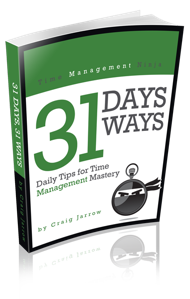 Are you constantly late to your meetings?
Are you constantly late to your meetings?
Always the one that others expect to be late?
No matter how hard you try to be “on time,” you end up showing up just after the start time.
What does it take to arrive on time to your appointments?
Stop Trying to Be “On Time”
When was the last time you were “on time” for a meeting?
Actually, what does that mean, “On time?”
To many, it means you walk in the door at the start time of the appointed meeting, arriving in a confused and hurried mess. Then, taking several minutes to compose yourself and getting ready to begin.
“Arriving 10 minutes early is on time. Showing up at the start time means you are already late.”
So, how do you break the stressful cycle of rushing from one appointment to the next, always arriving a few minutes behind schedule?
The trick is… stop trying to be on time.
Rather, you need to strive to be early.
This should be each and every time, not just when you feel the need.
This means you will need to change your approach…
- You will have to leave earlier.
- You must avoid back-to-back meetings. (Unless you are going to end one early.)
- You have to allow extra time for travel (even down the hall) for unforeseen delays.
- You have to expect to arrive 10 minutes before the start time of an obligation.
Don’t Be Late, Be Early
Get to your meetings early today.
Make your goal to be 10 minutes early to your appointments and meetings.
It will give you a new perspective… and you won’t be late either.
Question: How do you prevent yourself from being late to your obligations? You can leave a comment by clicking here. I am the author of Time Management Ninja and help individuals and companies reclaim their time to be more productive. As well, I am the author of the book
I am the author of Time Management Ninja and help individuals and companies reclaim their time to be more productive. As well, I am the author of the book 

Excellent advice, this is. I prevent being habitually late by planning to arrive at a location about 10 or 15 minutes ahead of time. If I have a meeting, class, or appointment that starts at 9:00, and I pull into the parking lot at 9:00, I’m late. My always says, “If you can be consistently ten minutes late, you can be consistently ten minutes early.” I also “count backwards” mentally on my time to know about when I should get out the door, and I have a good idea of how long each time segment will take to get somewhere: including walking from the parking lot, going up an elevator, etc. Those all add up, and they add up to being late if I don’t factor those in.
So true!
And as well as appointments, I think the same can be said for deadlines.
As I transition into full time freelance work with multiple streams, I am starting to experience the pain of over-promising (on time, anyway), and working out how long I need to take for each assignment.
Of course, editors want pieces (I’m a writer) as soon as possible.
My dad always taught us that on time is 10 minutes early. It saves me so much stress if I have to be late for some reason. I hate when people arrive 10 minutes late to an appointment because they didn’t plan.
Your dad taught you wrong. On time is on time! Early is early! What part of that do people not understand? The expression is only good if you plan on selling bumper stickers.
I write my appointment in my daybook a half hour early and then I forget that I have a half hour cushion and add another half hour so arrive an hour early.
Being on time is not being early at all!
There are way too many individuals that can’t estimate time either because of lack of mathematical and logical abilities or because nature just made them that way. Let’s face it there is all kinds of people in this world just as there are so many kinds of bosses.
10 minutes early per day is almost an hour per week, which in turn in 4 hours per month which is 48 hours per year AN ENTIRE PAYCHECK. So, smart managers would try to manupulate psychologically weak individuals into believing that arriving early is the right thing to do. If they succeed in forming the habit, you are short a paycheck per year and the company’s profits go up.
Measure your time and if needed arrive there early but don’t walk in until it is TIME for you to be there.
If they want you there early, ask them to pay you for it. It’s federal law, and the ten minute rule is bs.
Don’t be a pushover just because you don’t own the company and because you need to feed your family. Big money always takes advantage of this fact to take advantage of you.